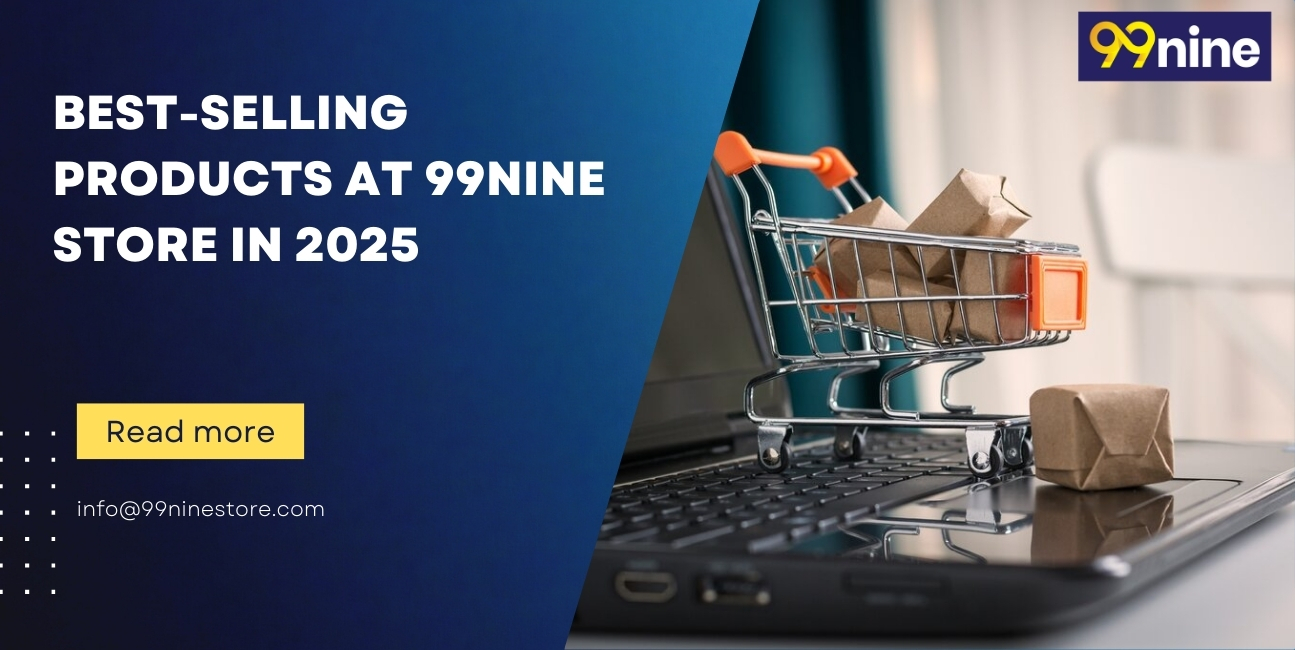

Best-Selling Products at 99nine Store in 2025
Walking into a 99nine Store feels like discovering a retail treasure hunt. In the bustling markets of India where e-commerce giants continuously vie for screen time, this brick-and-mortar chain has quietly revolutionized how middle-class Indians shop for daily essentials. With over 30 physical outlets across 25+ cities—from metropolitan hubs like Mumbai and Delhi to emerging centers like Coimbatore and Lucknow—99nine Store has become the go-to destination for savvy shoppers who prefer to “see before they spend.”
Let me take you through the aisles of what makes this uniquely Indian retail concept so popular in 2025, and why certain products simply fly off their shelves faster than fresh jalebis at a festive mela.
Why 99nine Store Remains a Hub for Physical Shopping in 2025
At a time when nearly everything can be ordered online with a few taps, what makes thousands of Indians still queue up outside 99nine Store outlets every weekend? The answer lies in the retail experience they’ve crafted—something distinctly different from the clinical efficiency of e-commerce.
Each 99nine Store maintains its signature price range of ₹99 to ₹999, making quality products accessible without the dreaded “delivery fee” or “minimum order” barriers that online platforms impose. Market research firm RetailScape India noted in their March 2025 report that despite e-commerce penetration reaching 67% in urban India, specialized affordable retail chains like 99nine Store saw footfall increase by 23% year-on-year.
“There’s something deeply satisfying about picking up a kitchen tool, testing its grip, and knowing it’s coming home with you that very minute,” says Reena Sharma, a loyal 99nine Store customer from Pune. This sentiment echoes across demographics—from college students furnishing their first PG accommodations to joint families equipping their homes with affordable essentials.
While the company maintains a comprehensive website (refreshed quarterly with new product categories), it serves purely as a marketing platform rather than a sales channel. The site helps shoppers discover what’s available before making the trip, but the actual purchase experience remains refreshingly old-school—complete with the satisfaction of immediate ownership that same-day delivery simply can’t match.
Shopping Smart at 99nine Store Without the Digital Crutches
In an era where many of us won’t order a plate of pani puri without checking its online rating, shopping at 99nine Store offers a return to more instinctual consumer behavior. Since the chain doesn’t provide online reviews or operate through an app, here’s how the smartest shoppers make the most of their visits:
Visit during weekday mornings (preferably Tuesday or Wednesday between 11 AM and 2 PM) when stores are least crowded. This allows for more leisurely browsing and better access to staff recommendations. Weekend crowds, especially in metro locations, can make it challenging to properly inspect products.
Build rapport with store associates—many of whom have worked at the same location for years. Unlike the algorithm-driven recommendations of online platforms, these individuals know exactly which stainless steel tiffin box has the most reliable locking mechanism or which bamboo cutting board won’t warp after washing.
Look for the distinctive orange “New Arrival” tags that indicate products added within the past fortnight. These items are typically placed on end-caps or special display tables near the entrance.
Check manufacturing details carefully. While all products undergo quality checks, items from certain manufacturers like Suhana Plastics (Maharashtra) and Bhavani Kitchenware (Tamil Nadu) have built reputations for exceptional durability at entry-level price points.
Pay attention to the store’s rhythms. Seasonal goods typically arrive two weeks before major festivals, while home organization products see fresh stock early in the calendar year to coincide with the post-Pongal/Sankranti cleaning tradition in many Indian households.
What’s Actually Selling: Top Product Categories at 99nine Store in 2025
Kitchen Corner: Where Functionality Meets Affordability
The kitchen section continues to be the crown jewel of 99nine Store, accounting for nearly 40% of overall sales according to store managers. The range combines traditional Indian cooking needs with contemporary design sensibilities:
- Regional Cooking Tools (₹149-₹399): The South Indian filter coffee maker (₹299) and the multi-purpose belan-chakla set (₹249) remain perennial bestsellers. The newly introduced Gujarati gathering (stackable spice container system) priced at ₹399 has seen remarkable uptake since its February launch, with most stores reporting stockouts within days of restocking.
- Chai Culture Collection (₹99-₹349): This curated line of tea strainers, kulhads with matching saucers, and insulated tumblers celebrates India’s tea-drinking ritual. The stainless steel cutting-chai glasses with copper bottom (₹299 for a set of four) have found their way into both modest apartments and luxury homes, proving that certain classics transcend economic boundaries.
- Tiffin Solutions (₹199-₹799): From school children to office-goers, the Indian tiffin tradition remains strong despite the rise of food delivery apps. The leak-proof three-tier steel tiffin (₹499) and the microwavable glass lunch container set (₹799 for a set of three) compete for the attention of working professionals, while the compact roti box with separate sabzi compartment (₹249) remains popular with school children.
- Steel Supremacy (₹149-₹699): The traditional Indian preference for stainless steel kitchenware shows no signs of waning. The recently introduced hammered-finish katori set (₹399 for six pieces) and the multi-purpose serving tray with partition (₹349) have joined the ranks of bestsellers previously dominated by the classic steel water bottle (₹199-₹399 depending on capacity).
- Eco-Friendly Innovations (₹99-₹599): With plastic reduction becoming a priority across India, coconut shell serving bowls (₹199 each), bamboo cutlery sets (₹299), and banana leaf pattern melamine plates (₹499 for a dinner set of four) represent the growing eco-conscious segment that blends sustainability with Indian aesthetic sensibilities.
Personal Care: Indigenous Ingredients Meet Modern Packaging
The personal care section has transformed from a small corner to a major department, reflecting India’s growing self-care consciousness:
- Ayurvedic Essentials (₹99-₹399): Products featuring traditional ingredients like neem, turmeric, and aloe vera dominate this category. The standout performer is the cold-pressed mustard oil hair treatment (₹299) that combines grandmothers’ wisdom with contemporary packaging. Similarly, the ubtan face pack powder (₹199) which requires mixing with raw milk or curd before application connects younger shoppers with traditional beauty rituals.
- Bath Culture (₹99-₹349): The bathing ritual—still sacred in many Indian households—finds expression through copper tongue scrapers (₹149), multani mitti bath powder (₹99), and neem wood combs (₹199). The unexpected bestseller has been the plastic-free loofah grown in Karnataka’s organic farms (₹249), which replaced synthetic versions in early 2024.
- Home Fragrance (₹199-₹599): Moving beyond the standard incense sticks, this category now includes dhoop cones (₹199 for a pack of 20), camphor tablets (₹99), and essential oil warmer sets (₹499). The mogra and jasmine room mist (₹349)—developed specifically for Indian preferences—outsells international fragrance profiles by a significant margin.
- Men’s Grooming (₹149-₹499): Once an afterthought, this section now features beard oils infused with Indian herbs (₹349), sandalwood shaving soap (₹199), and multifunctional trimming kits (₹499). The khadi cotton handkerchief set (₹249 for three) continues the tradition of pocket squares that many Indian men still maintain.
Home Organization: The Battle Against Limited Space
In a country where urban homes often maximize functionality in minimal square footage, organization products have seen exponential growth:
- Vertical Solutions (₹299-₹799): Wall-mounted spice racks (₹399), behind-door organizers (₹499), and stackable storage bins (₹299-₹599) help urban dwellers make use of every available centimeter. The corner shelf unit (₹799)—specifically designed to fit Indian bathroom dimensions—solves the universal challenge of awkward corner spaces.
- Sari and Fabric Storage (₹349-₹899): Recognizing the need to protect precious textiles, the breathable cotton sari covers (₹449 for three), blouse organizers (₹349), and the innovative dupatta hanging system (₹399) address distinctly Indian wardrobe requirements that multinational retailers often overlook.
- Festival and Occasion Storage (₹399-₹999): Seasonal items need proper storage in India’s varied climate conditions. The Diwali decoration box with compartments (₹699), wedding jewelry organizer (₹999), and moisture-resistant Ganesh Chaturthi accessories case (₹599) provide specialized solutions for items that hold both monetary and sentimental value.
- Tech Organization (₹149-₹599): With the average Indian household now owning multiple devices, the multi-device charging station (₹599), remote control organizer (₹249), and cable management system (₹299) help tame the technology clutter that increasingly defines modern living rooms.
Children’s Corner: Educational Play Without Digital Distractions
Parents seeking alternatives to screen time find solace in the toy section:
- Brain Development (₹199-₹699): Indian mathematical games like the traditional wooden abacus (₹499), advanced Vedic math puzzles (₹399), and geography learning tiles featuring Indian states (₹599) combine cultural heritage with educational value.
- Outdoor Play (₹99-₹499): Despite shrinking play areas in urban settings, traditional games like gilli-danda sets (₹349), modernized lagori (seven stones, ₹299), and kite-flying kits (₹199, seasonal) maintain their appeal, especially during school holidays.
- Art Supplies (₹149-₹399): Eco-friendly crayons made from natural wax (₹249), clay modeling kits featuring Indian mythology characters (₹399), and DIY warli painting sets (₹349) nurture creativity while connecting children to cultural traditions.
Join the Community: Follow us on social media to stay updated on exclusive deals, new arrivals, and tips for better living!
The 99nine Pricing Strategy: Making Quality Affordable
The genius of 99nine Store lies in its pricing architecture that creates clear consumer expectations. The price band of ₹99 to ₹999 is strategically designed to hit the sweet spot in Indian consumer psychology—above the “cheap but questionable” category yet below the premium threshold that triggers purchase hesitation.
This pricing strategy applies consistent logic across categories:
- Entry-level essentials (₹99-₹199): Everyday necessities that drive repeat visits and build shopping habits. These include kitchen basics, personal care staples, and small organizational tools.
- Mid-range quality goods (₹299-₹499): Products offering noticeable quality improvements over budget alternatives without approaching premium pricing. This bracket includes most kitchenware, home décor items, and personal care gift sets.
- Premium everyday items (₹599-₹999): The highest quality offerings within each category, often featuring enhanced durability, premium materials, or multi-functionality. These items compete with specialized retailers but at significantly lower price points.
The pricing remains consistent across locations, creating a reliable shopping experience whether you’re visiting the flagship store in Mumbai’s Linking Road or the newer outlet in Bhopal’s New Market area.
Beyond Transactions: The 99nine Shopping Experience
What separates 99nine Store from both e-commerce platforms and traditional kirana shops is the carefully crafted shopping environment that balances Indian retail traditions with contemporary store design:
- Store Layout: Unlike the maze-like configurations of some retail spaces, 99nine Store follows a circular flow with clear sightlines across departments. This design—inspired by traditional Indian bazaar layouts—allows shoppers to orient themselves easily while still encouraging discovery.
- Trial Stations: Select locations have introduced “try before you buy” stations for kitchenware, allowing customers to test the grip of knives or the balance of serving spoons before purchase. This hands-on approach recognizes the tactile nature of Indian shopping habits.
- Regional Customization: While maintaining consistent branding, stores adapt to local preferences. The Chennai outlets dedicate expanded space to steel cookware and coffee accessories, while Delhi locations feature larger sections for winter-specific items and north Indian cooking tools.
- Seasonal Transformations: Stores undergo dramatic transformations ahead of major festivals, with dedicated sections for Diwali, Durga Puja, Onam, Christmas, and Eid. These seasonal updates—often featuring region-specific celebrations—give regular shoppers new reasons to visit throughout the year.
Customer service remains decidedly old-school, with staff available to answer questions, demonstrate product features, and sometimes even suggest alternative uses for items based on local practices. This human element provides a stark contrast to algorithm-driven recommendations and has proven particularly valuable to elderly shoppers and those from tier-2 and tier-3 cities who may find online shopping intimidating.
The Road Ahead for Affordable Retail in India
As we move through 2025, 99nine Store continues to demonstrate that physical retail remains relevant and vibrant in the Indian context. The company’s expansion plans include 15 new outlets before Diwali 2025, with particular focus on cities like Indore, Vijayawada, Dehradun, and Shillong—markets where the combination of rising disposable income and value consciousness creates ideal conditions for the 99nine retail concept.
What makes 99nine Store particularly interesting is how it has adapted international retail best practices to distinctly Indian shopping behaviors and preferences. By maintaining focus on physical locations rather than dispersing resources across multiple channels, the company has created shopping environments that feel authentically Indian while delivering consistent quality and value.
For consumers navigating inflationary pressures while aspiring to improve their quality of life, 99nine Store offers a refreshing middle path—an opportunity to access thoughtfully designed, quality products without premium pricing. Whether you’re setting up your first home, searching for affordable gifting options, or simply looking to upgrade everyday essentials, the treasure hunt atmosphere and carefully curated selection make each visit worthwhile.
In the end, 99nine Store’s success springs from understanding that for many Indian consumers, shopping remains as much about the experience as the acquisition—a social activity, a skill to be mastered, and sometimes even a family tradition passed through generations. By honoring these cultural nuances while making quality accessible, 99nine Store has earned its place in India’s evolving retail landscape.
FAQ
Your Questions About 99nine Store, Answered
The store locator on the 99nine website is updated monthly with new locations. Alternatively, you can give a missed call to 9871927806, and you'll receive an SMS with details of the three outlets closest to your location based on your registered mobile number's circle.
No, 99nine Store operates exclusively through physical retail locations. The website serves as a catalog to browse product categories before visiting stores but does not offer e-commerce functionality. This strategy allows the company to maintain lower prices by eliminating delivery infrastructure costs.
All outlets accept cash, major credit/debit cards, UPI payments (including BHIM, Google Pay, PhonePe, and Paytm), and the 99nine loyalty card which can store prepaid credit. Select locations in metropolitan areas also support the National Common Mobility Card (NCMC) for contactless payments.
Non-perishable, unused items in original packaging can be returned within 7 days with the original receipt. Items priced at ₹99-₹299 are eligible for exchange only, while those above ₹299 qualify for refunds to the original payment method. Personal hygiene products, food items, and clearance merchandise are not eligible for returns or exchanges.
Basic essentials remain constant, but approximately 25-30% of the merchandise rotates monthly. Major category refreshes occur five times annually, coinciding with the start of summer, monsoon, fall, winter, and spring. Festival-specific merchandise typically arrives 3-4 weeks before major celebrations.



